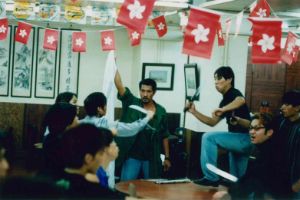Film | Sundays for Hong Kong II
The Longest Summer
HK 1998, 35mm
Directed by Fruit Chan

Film still from “The Longest Summer”
Dear Audience, It is with great regret that we have to inform you that the event has to be cancelled due to the current developments connected with the spreading of the Corona virus.
Berliner Festspiele on Demand: From 9 April until 7 May we present four films of the series on our website.
As the red flag of the People’s Republic of China is hoisted up the flagpoles instead of the Union Jack, Ga Yin loses his job. Having led a comfortable and isolated life in the British army, he feels like an abandoned child when he reenters Chinese society. He has to start over. Ga Suen is Ga Yin’s younger brother, a typical representative of the new Hong-Kong-generation that embodies vitality and entrepreneurial spirit. He wants to get rich quickly and knows some crooked ways to make money. Ga Yin is not alone in his predicament; many of his colleagues from the army share his fate. The emerging economic depression makes it even harder for them to find a job with reasonable pay. In this situation and having lost all their ideals and prospects, they join Ga Suen’s gang. Their ringleader wants to exploit their combat-experience and prepares an elaborate bank heist. After that, there is no chance of escaping the world of crime for the men. They are followed not just by the police but also by another underworld outfit. They have become prisoners of violent conditions that they can only meet with more violence.
Fruit Chan was born on 15 April 1959 in Canton, China and moved to Hong Kong with his family at the age of 15. He studied at the Hong Kong Film Culture Centre, where he presented film programmes and taught film after his graduation. In 1982, he started working as an assistant director in independent film production and joined Golden Harvest in 1984, where he worked with artists like Jackie Chan, Sammo Hung, Tony Au and Shu Kei. In 1991, he created his first feature film, “Finale in Blood”. His second film, the low-budget production “Made in Hong Kong” was shot in 1997 and brought him greater recognition. He was the first film maker to work independently from the big studios, subverting the genre of the Hong Kong-movie and creating realistic films about the political and social situation in Hong Kong. The film was the first part of a trilogy that included “The Longest Summer” and “Little Cheung”.